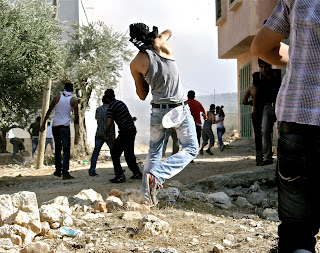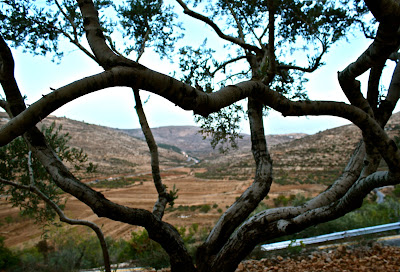If you routinely answer your phone perched tenuously atop an olive tree, then you are either a crazy person, or someone who picks a lot of olives – draw your own conclusions. Yesterday I received a call, in such a position, and was informed of a house being demolished in Hares, a nearby town (we would later find out that three houses were being demolished, on that day, and 14 more were set for demolition at a later time).
Though the embers of the previous night’s fire were still smoking in our minds, John and I forgot about everything else, and made our way to Hares.
There we encountered a lopsided standoff. Heavily armed Israeli soldiers and Border Police had a cement-block house completely surrounded. Army vehicles and bulldozers edged the nearby road. Inside the house there were Palestinians, and on the other side of the Israeli defense shell there were more Palestinians (roughly 20 Israeli soldiers/border police and 60 Palestinians). One group had an array of weapons the other had rubble. There were also 10 internationals, including ourselves.
The situation was tense! We ran around documenting, unable to position ourselves within the house that would soon be destroyed. In these kinds of situations we, very quickly, weigh the choice of interposing ourselves versus witnessing the event. It is not easy to choose the latter, the injustice smacks you in face.
When the bulldozer moved toward the house, the fuse was lit, the house sitters evacuated, and the situation went off. Palestinians picked up stones, from around the Israeli line of defense, and began throwing them toward soldiers and police. In the other direction soldiers fired tear gas, sound grenades and rubber coated steel bullets, which can be lethal if taken to the chest or head. I have no idea which side escalated the violence, but that does not matter, it was bound to play out like it did. This is not a new story I am telling.
This went on for hours (not an exaggeration) the house demolition continued, one… two… three houses, while Palestinian rock throwing ebbed and flowed.
At one point we found ourselves rushed into a nearby building, close to the first house that was being demolished. We were told that soldiers had begun using live ammunition. In hindsight we strongly question the veracity of this claim. Regardless, we waited inside while soldiers surrounded the perimeter. Amongst us were medics and women. The women were huddled together and crying. Their sons were outside, as young as ten years old, throwing rocks, physically expressing their pent up anger at the symbol of occupation.
I want to end this by taking a moment to consider the house owners, the mothers, and their children in the street. Forget about the Palestine/Israel geopolitical malaise, and the myriad narratives we associate with the struggle. After all this is a story about people living under extraordinary pressure.
If you are a Palestinian homeowner you might have your house demolished, left helpless, without any legal recourse. That knock on the door could come at anytime. If you are a Palestinian mother you are experiencing deep maternal pain. Your children cannot grow up to be whatever it is they want to be. Is it your responsibility to tell them why they cannot become a doctor, or why they cannot see the world for themselves? Imagine being that child, all you know is the occupation. How else, besides throwing rocks, should you get that terrible anger inside of you out?
Just before we left Hares an elderly woman came up to us, she was hysterical, and her eyes looked red from crying for a long time. She spoke frantically, screaming at us, or maybe at a higher power. We asked for a translation and were told that she was pleading for help. Not help from a neighbor, or help from the government, but help from the burden, the yoke of injustice.
Like bountiful olive trees that grow from arid soils, Palestinians exhibit love and kindness in the midst of such injustice. We feel safe here, and we feel a great affinity for Palestinians and their beautiful culture. And in the midst of pain and suffering there is happiness and laughter. Every single day we experience what it means to be Palestinian and we are much better off for it.
You might be asking yourself, why would Israeli’s go through all of this to demolish a few houses? I surely was. Here is a little context.
In the West Bank there are three types of non-contiguous land area, which are designated as areas A, B, and C. They were delineated during the Oslo II Accords in 1995. Area A means full civil and security control by the Palestinian Authority (PA). Area B means Palestinian civil control and joint security control (go ahead have a laugh). Area C means full Israeli civil and security control. 18% of the West Bank is Area A, 21% is Area B and 61% is Area C. Area C is where this story takes place. Area C is where illegal Israeli settlements, settler bypass roads, areas zoned for settlement expansion, and finally what the military complex calls “security zones” are located.
Hares is a small town, which happens to be nearly surrounded by Israeli settlements. Including the largest settlement in the West Bank – Ariel (like the mermaid). The 17 houses being demolished with bulldozers are on the edge of town. And by edge I mean they are basically in the town of Hares. Israel considers these houses to be Area C, and thusly they can be demolished legally. Though legality in this context is opaque and pliant to the will of those in power.




Many of the workers in Hares work in a "very unsafe for workers" factory in a nearby Israeli settlement. Foremen bit neighbor against neighbor. The brutality of Israel is present also in that. Thank you MPTers for your nonviolent presence and in helping the world know what is happening to a people who too hope for an Arab spring.
ReplyDeleteone of my favorite posts!
ReplyDeleteThis is a great post. I believe it is our only post about home demolitions, which are not as prevalent as they were during the 2nd Intifada, but still a huge issue. It includes a very compassionate explanation about why young Palestinians throw stones. On the one hand, I think anyone who can't/won't make an effort to understand stone-throwing is just dumb, and that speaking truth to power includes telling the truth as we see it to our friends and donors as well as to the government, the military, etc. On the other hand, I think there were people even in the MPT office who saw this as a justification of violence, and I wonder if putting this in the final selection will be uncomfortable for staff, be a problem with donors, etc.
ReplyDeleteThis comment has been removed by the author.
ReplyDeleteThe stone throwing issue came up when I was in the West Bank, shortly after I wrote this. I totally understand how it might come across as supporting violence, and I am happy to change some words, or add a line about not supporting it. However, I really believe in empathy and understanding the perspectives of others; and witnessing children throw rocks really resonated with me.
ReplyDelete#3 This analytical piece is very good. However seeming to say that stone throwing is a viable choice is questionable, it is not even very good strategically. It may need a comment about this questionability by MPT. Yet each teamer pondered this, some choosing not to write about it - not honest either. I think I would put it in with something like - - throwing is one way to respond. There have many other means used before this including costly legal processes which most home owners have used. We would wish for a nonviolent response – but this is not our struggle. The world turns its back so people resort to what is near at hand -rocks." This is understandable, but not nonviolent. How to comment about it, keep it in perspective and not lay judgment on an oppressed people. NOT SURE what to do. A challenge.
ReplyDeletePowerful.
ReplyDelete